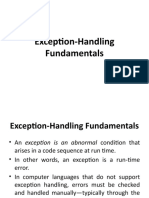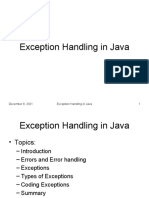0% found this document useful (0 votes)
34 views41 pagesException Handling
The document discusses exception handling in Java programs. It describes three types of errors that can occur: syntax errors, runtime errors, and logic errors. It explains what exceptions are and how they are used to handle runtime errors. The key aspects of exception handling in Java including try, catch, throw and throws keywords are covered along with examples of using exceptions.
Uploaded by
rashy1992ntkCopyright
© © All Rights Reserved
We take content rights seriously. If you suspect this is your content, claim it here.
Available Formats
Download as PDF, TXT or read online on Scribd
0% found this document useful (0 votes)
34 views41 pagesException Handling
The document discusses exception handling in Java programs. It describes three types of errors that can occur: syntax errors, runtime errors, and logic errors. It explains what exceptions are and how they are used to handle runtime errors. The key aspects of exception handling in Java including try, catch, throw and throws keywords are covered along with examples of using exceptions.
Uploaded by
rashy1992ntkCopyright
© © All Rights Reserved
We take content rights seriously. If you suspect this is your content, claim it here.
Available Formats
Download as PDF, TXT or read online on Scribd
/ 41
























































